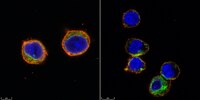LMR001 Sigma-AldrichCell Capture Imaging Reagent
Cell Capture Imaging Reagent is a specially formulated polymeric hydrogel that allows cells to be constrained at the bottom of microtiter plates for subsequent imaging.
More>> Cell Capture Imaging Reagent is a specially formulated polymeric hydrogel that allows cells to be constrained at the bottom of microtiter plates for subsequent imaging. Less<<Prodotti consigliati
Panoramica
| Replacement Information |
|---|
| References |
|---|
| Product Information | |
|---|---|
| Format | Liquid Reagent |
| Presentation | Clear viscous liquid. |
| Biological Information | |
|---|---|
| Concentration | Please refer to lot specific datasheet. |
| Species Reactivity Note | . |
| UniProt Number | |
| Molecular Weight | N/A |
| Physicochemical Information |
|---|
| Dimensions |
|---|
| Materials Information |
|---|
| Toxicological Information |
|---|
| Safety Information according to GHS |
|---|
| Safety Information |
|---|
| Storage and Shipping Information | |
|---|---|
| Storage Conditions | Stable for 1 year at 2-8°C from date of receipt. |
| Packaging Information | |
|---|---|
| Material Size | 8 mL |
| Transport Information |
|---|
| Supplemental Information |
|---|
| Specifications |
|---|
| Global Trade Item Number | |
|---|---|
| Numero di catalogo | GTIN |
| LMR001 | 04061841037675 |
Documentation
Cell Capture Imaging Reagent MSDS
| Titolo |
|---|
Cell Capture Imaging Reagent Certificati d'Analisi
| Titolo | Numero di lotto |
|---|---|
| Cell Capture Imaging Reagent | 3765673 |
| Cell Capture Imaging Reagent - 3725949 | 3725949 |
| Cell Capture Imaging Reagent - 4060898 | 4060898 |
| Cell Capture Imaging Reagent - 4089688 | 4089688 |
| Cell Capture Imaging Reagent-Q3275735 | Q3275735 |















